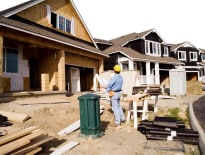
A battle has raged for more than 10 years over a proposed 40B development in the Belmont Uplands (pictured). The developer received permitting approval last year.
The latest unfortunate reports about Sen. Brian Joyce’s alleged extracurricular activities point to the completely rotten way we vet new housing proposals here in the Bay State.
Joyce is now under investigation by federal prosecutors and the FBI for allegedly pocketing a $250,000 fee for his law firm from a developer looking to build a mix of affordable and market-rate apartments in his senate district in Randolph.
Joyce first backed neighbors fighting plans by a developer to build 250 apartments an adjacent industrial park, only to later switch sides and help push the project through after his firm got its big fee, The Boston Globe reports.
It’s the latest setback for the Milton Democrat and one-time Beacon Hill powerbroker; Joyce is already facing charges allegations he abused his power as a state senator to drive business to his law firm and get thousands of dollars in free dry cleaning from a local business.
However, some of the facts laid bare by the story point to a much larger problem than simply a wayward local politician and his allegedly unscrupulous behavior. In a state starved for new housing of all types, we have a completely dysfunctional and counterproductive way of reviewing proposals for new apartments, homes and condominiums. Local officials hold far too much power in a convoluted system that takes far too long and has far too many hoops to jump through. And that’s even before we get to the anti-housing attitudes – mixed with outright fear and prejudice when it comes to anything labeled “affordable” – that are so prevalent in suburbs and small towns across the state.
The result has been a dearth of new housing that has pushed both prices and rents to unsustainable levels.
Here are some key problems highlighted by the Joyce scandal.
It takes too long: Getting housing approved takes far too long in Massachusetts, especially in our often NIMBY suburbs. Waltham-based Dolben Co. first began pushing plans to250 apartments at Pacella Park, an industrial area next to a residential neighborhood in North Randolph, in 2009. It took the company until 2013 – four years later – to win a simple zoning change that would allow apartments to be built in the industrial park.
We’re not talking about virgin forest or unspoiled farmland here. Yet such a years-long battle is the norm, not the exception, in many Boston suburbs when it comes to multifamily housing. Most towns do not have zoning rules for apartments and condos, requiring builders to go through an onerous special permit process similar to what happened in Randolph. In fact, a few towns even specifically prohibit multifamily construction. All these restrictions also limit the amount of land and number of sites available for residential development, forcing builders to seek out industrial parks and any other odd spot, as is the case in Randolph.
Tin-pot dictators: The current, convoluted approval process puts tremendous power in the hands of a few local officials. Town officials – and apparently state lawmakers as well – can manipulate the permitting process to drag out a project if they want to force concessions, or even kill it if they don’t like it. In frustration, many developers have turned to the state’s 40B process, which enables them to bypass such local obstructionism if they pledge to rent 20 percent of their units at below-market rates.
Long, drawn out haggling, can in turn provide temptations for the unscrupulous. Joyce allegedly got the developer pushing the new Randolph apartments to hire his law firm by promising a smooth approval process, the Globe reports. Dolben had balked at first, already having its own lawyers working on the case. Joyce then went to bat behind the scenes, allegedly helping coach an independent consultant hired by the town to submit a favorable report, the paper reports.
Housing bigots: Neighbors of the industrial park where Dolben wants to build apartments were apparently under the impression that it was some sort of nature preserve. While a trucking company or some other industrial user could have moved in at any point, neighbors were instead tearing their hair out over the prospect of plans to mix in a few “affordable” rentals with the market rate apartments. Such subsidized units, complained one neighbor in a local news story, would bring with it a “stigma” that would wreck the neighborhood. Mind you, we are talking about apartments affordable for local workers and teachers, not old-style public housing. But that’s the kind of fear and outright prejudice that too often drives the opposition to new housing.
Of course, the Randolph neighbors are not alone in their suspicion of new housing – especially of the rental variety. The Randolph situation and the corruption allegations it has spawned simply highlight the wretched public attitudes towards new housing of just about any sort here in blue-state Massachusetts.
We may be all for battling global warning, but many could apparently give a hoot about the growing numbers of renters and buyers who can’t find an affordable place to live.






